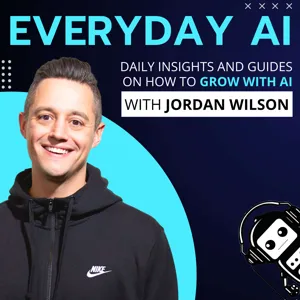Podcast Summary
AI's profit potential faces challenges for startups: Despite hype, clear business models and use cases for AI are lacking, and concerns about inaccuracy and customer backlash persist, especially in health tech sector.
While there is a lot of hype around AI and its potential to generate profits, there are still many unanswered questions and challenges for startups looking to compete in this space. At the World Economic Forum in Davos, investors and business executives discussed the lack of clear business models and use cases for AI. A survey by Boston Consulting Group found that many companies are approaching AI with caution, using it in limited ways or waiting for it to advance beyond current hype. The potential for inaccuracy and fabrications, as well as the potential for customer backlash against replacing human interactions, are also concerns. In the health tech sector, which is Christina Farr's investment focus, there are potential use cases for AI in note taking and customer service, but there are also concerns about accuracy and the need for human oversight. Overall, the consensus at Davos was that there is still a lot to learn and figure out before AI can truly deliver on its profit potential.
AI in healthcare: Note-taking and summarization accepted, diagnoses resisted: AI is making strides in healthcare with note-taking and summarization, but faces resistance when it comes to diagnoses. The FDA's approval of CRISPR for gene editing is a significant development, but raises questions about cost and unintended consequences.
There's growing acceptance for AI in healthcare, particularly for tasks like note-taking and summarization. However, there's more resistance when it comes to AI-assisted diagnoses. The FDA's recent approval of CRISPR for treating inherited blood disorders is a significant step forward in gene editing technology. While this development is exciting, there are still many questions to answer, such as cost and potential unintended consequences. Overall, the healthcare sector is embracing AI and gene editing technologies, but there are important considerations to address.
Affordability Challenges of Personalized Genetic Treatments: Despite their potential benefits, personalized genetic treatments like CRISPR face significant affordability challenges and long-term cost considerations, while alternative treatments like stem cell transplants have their own unique hurdles.
Personalized treatments like CRISPR for genetic diseases offer great promise but come with significant affordability challenges. The high cost of these treatments, estimated to be around $3.5 million, raises questions about insurance coverage and the financial viability of insurance companies. While the long-term cost savings could be substantial, the current healthcare system does not always account for long-term health. Comparatively, treatments like stem cell transplants, which also offer solutions for genetic diseases, face challenges with finding donor matches and long wait times. CRISPR treatments, on the other hand, could potentially treat patients sooner, but they also bring affordability concerns and potential downstream consequences. The marketing of health tech companies can also impact their success, with misinformation and hype potentially hindering their growth and public perception.
Bridging the gap between B2B marketing and consumer engagement: Effective consumer marketing is crucial for digital health companies to succeed. Utilize Amazon's consumer marketing expertise as an example, and avoid intrusive tactics to respect privacy concerns.
Consumer awareness and effective marketing are crucial for digital health companies to succeed. The speaker expressed frustration with the dry and boring business-to-business (B2B) marketing language often used in digital health, which can fail to reach and engage the end-users: patients. This disconnect can result in low utilization rates despite big contracts. Amazon's recent partnership with Armada, a diabetes-focused company, is an example of a potential solution. By leveraging Amazon's consumer marketing expertise, they could increase utilization significantly. However, finding effective ways to reach specific target audiences, such as LGBTQ employees, remains a challenge. The speaker emphasized the importance of avoiding creepy or intrusive marketing tactics and respecting privacy concerns. Overall, digital health companies need to find innovative ways to bridge the gap between B2B marketing and consumer engagement to maximize their impact.
Addressing concerns around privacy and financial literacy: Companies need to address privacy concerns in the workplace and provide accessible resources for kids to learn about money for their future financial well-being
Privacy is a significant concern for many individuals when it comes to sharing personal information with employers. Christina Farr from Omers Ventures expressed this sentiment during a discussion on Marketplace Tech Bites. Amazon's recent offering is seen as a step in the right direction, addressing this concern. Meanwhile, for kids, understanding complex concepts related to money can be a challenge. Million Bazillion, a podcast from Marketplace, aims to tackle these issues head-on. Each episode covers various questions from kid listeners, providing explanations to help them grasp the world of finance. These two examples illustrate the importance of addressing concerns around privacy and financial literacy. For adults, privacy is essential in the workplace, and companies need to consider this when offering new services. For children, having accessible and engaging resources to learn about money is crucial for their future financial well-being.






